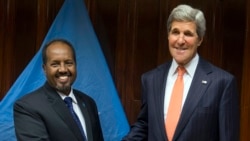Long torn by clan rivalries, stricken by drought and resulting famine, and attacks by a militant extremist group, the East African nation of Somalia nevertheless has made important strides since completing its political transition in 2012.
A new federal Parliament and Speaker were elected, a provisional constitution adopted, a new President elected, and new prime minister and cabinet named. In a nation once synonymous with chaos, there are hopeful signs of improved security and economic growth.
Throughout the process, the United States has stood with the Somali people, providing security, governance and humanitarian assistance to help strengthen democratic institutions and improve stability. Recognizing Somalia’s progress and as a sign of our nation’s faith that better times are ahead, President Barack Obama will soon name a U.S. ambassador to serve there, boosting our relations further.
Since our embassy closed in 1991 amid the country’s then-growing instability, a Nairobi-based special representative and supporting staff for many years traveled back and forth to Mogadishu to advance U.S. interests in Somalia. When the new ambassador is named, that system will continue. But as conditions continue to improve, it is envisioned that an embassy will be re-established in the capital. That will give our diplomats, aid administrators and other U.S. personnel increased contact with Somalis and Somalia’s leaders and oversee continued U.S. support.
In announcing the decision, U.S. Undersecretary of State for Political Affairs Wendy Sherman cautioned that while Somalia has come far in the last two years, many challenges and threats remain. The al-Qaeda-linked terrorists al-Shabaab have been weakened, but not defeated. Government services are uneven and tens of thousands of Somalis remain displaced from their homes by violence.
To keep making progress, the pivotal test for Somalia will not be securing more aid from the United States and other international partners, the undersecretary said. Somalis will have to decide for themselves whether they want to exist as a loose community of separate clans, isolated from the world and in conflict with each other, or as a united nation with all the attributes, benefits, and responsibilities that such unity brings.
A new federal Parliament and Speaker were elected, a provisional constitution adopted, a new President elected, and new prime minister and cabinet named. In a nation once synonymous with chaos, there are hopeful signs of improved security and economic growth.
Throughout the process, the United States has stood with the Somali people, providing security, governance and humanitarian assistance to help strengthen democratic institutions and improve stability. Recognizing Somalia’s progress and as a sign of our nation’s faith that better times are ahead, President Barack Obama will soon name a U.S. ambassador to serve there, boosting our relations further.
Since our embassy closed in 1991 amid the country’s then-growing instability, a Nairobi-based special representative and supporting staff for many years traveled back and forth to Mogadishu to advance U.S. interests in Somalia. When the new ambassador is named, that system will continue. But as conditions continue to improve, it is envisioned that an embassy will be re-established in the capital. That will give our diplomats, aid administrators and other U.S. personnel increased contact with Somalis and Somalia’s leaders and oversee continued U.S. support.
In announcing the decision, U.S. Undersecretary of State for Political Affairs Wendy Sherman cautioned that while Somalia has come far in the last two years, many challenges and threats remain. The al-Qaeda-linked terrorists al-Shabaab have been weakened, but not defeated. Government services are uneven and tens of thousands of Somalis remain displaced from their homes by violence.
To keep making progress, the pivotal test for Somalia will not be securing more aid from the United States and other international partners, the undersecretary said. Somalis will have to decide for themselves whether they want to exist as a loose community of separate clans, isolated from the world and in conflict with each other, or as a united nation with all the attributes, benefits, and responsibilities that such unity brings.

















